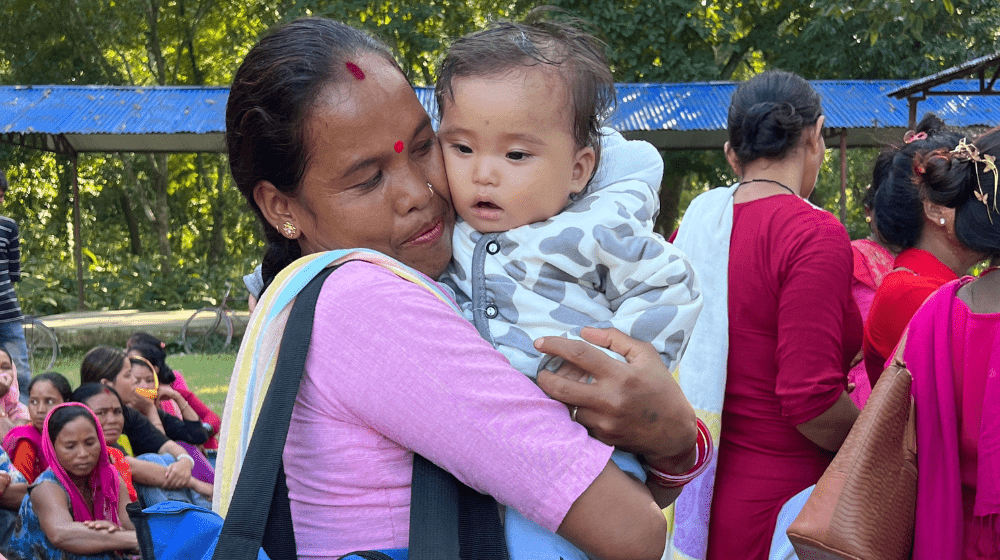On the frontlines
“We just received IARH kits* which are extremely useful for us to treat patients who have gone through violence. During disasters we know that women and girls are more affected as they are vulnerable to gender-based violence, unintended pregnancies and even sexually transmitted infections. These kits are helpful for us to detect and treat survivors of violence. During deliveries also there is always a high risk of complications for both mother and baby as we try to work in the context of a disaster with minimal equipment. And so we’re grateful for UNFPA’s assistance in this time of need” say Dr. Badri Chapagain, the Chief Medical Superintendent and Dr. Kaplana Thapa, Head of Department, Obstetrics and Gynecology of the Bheri Hospital in the Banke District of the Lumbini Province of Nepal.
Both these doctors are very much on the frontlines - serving hundreds of referred patients who were affected by the flooding of the Karnali River basin. And now, with the 6 sets of different IARH kits distributed to the Bheri hospital and the 7 sets of IARH and the rape treatment kits that were handed over to the Bardiya District and the One Stop Crisis Management Centre, the team of doctors will be able to reach over 1100 women and girls and 50 men and boys in the Lumbini Province alone.
This situation comes as prevailing monsoons in Nepal triggered major flooding and landslides stemming from a rise in waters of the Karnali River Basin which affected the Kailali District of the Sudurpaschim Province, and several districts in the Lumbini and Karnali Provinces claiming 36 lives and displacing over 80,000 people over the weekend of 08-09 October 2022.
The floods caused major damage to the road, bridges, hydropower stations and other physical infrastructures, washing away several suspension bridges which blocked access for relief workers to immediately reach the affected communities.
Rescue and relief efforts
A few days later, despite receding water levels, access to a number of villages in rural areas continued to remain a challenge as bridges and culverts collapsed and roads still submerged. Rescue and relief efforts by the Army involved boats and helicopters to reach stranded people. Food, water, sanitation and shelter were identified as the immediate needs of those affected. UNFPA responded by providing dignity kits to women and girls to ensure that their basic sanitation and menstrual hygiene are still maintained even as they cope with the disaster. In situations like this, pads, soaps, blankets, shawls are crucial as the cold weather slowly sets in.
UNFPA’s response was targeted at 6 municipalities of the Karnali river basin that fall under the UN Central Emergency Response Fund Anticipatory Action Pilot Project. According to the Anticipatory Action framework, under a funding envelope of US$3.2 million, UN Agencies such as WFP, UNFPA and UN Women commenced response when the action was triggered after the Karnali river basin reached the stipulated threshold.
And so it was a collective effort between the agencies involved.
In fact, for the first time, together with the World Food Programme, UNFPA also provided cash assistance to the affected women with pregnancy related complications and GBV survivors for referral services along with dignity kits to 12,855 women and girls. 12 UNFPA-trained community psychosocial workers were also mobilized to reach 3418 affected people. Moreover, 20,000 women and girls were provided with essential sexual reproductive health and GBV related messages through the mobilized Nepal Red Cross and Female Community Health Volunteers.
“With the money I received here today, I will buy some rice and food for my family,” says 26 year-old Sarita who lives with her 5 year-old daughter, one-month old son and husband in the Pattharbojhi village of Madhuban Municipality in the Bardiya District. She recollects how her family was affected exactly 5 years ago when the same river burst. “My first daughter was one month old at the time. We lost almost everything, but we survived by running away from the house. Every year, we struggle to survive the floods," says Sarita.
20 year-old Radha echoes Sarita’s sentiments. Hugging her 5 months old first daughter tight, she too speaks of the perils they face due to recurring floods which affect them almost every year.
"The risk of mosquito and snake bites are always there during the monsoon. Flood waters always enter the kitchen area. In the previous years, we were forced to live outside of our home, but this time, we didn't leave. How can I stay outside with my baby? We know the floods keep coming but where else would we live?”
Climate-vulnerable future
The increase in frequency however also means that as a country, Nepal can do more to be better prepared to respond to such recurring disasters.
While the Government and partners on the ground rush to respond to the immediate needs of the crisis, UNFPA is working to ensure that Governments across all tiers are better prepared to face future natural calamities while strengthening the capacity of first responders to ensure the needs of women and girls are not overlooked during a crisis.
UNFPA is also continuously training health workers, gender-based violence service providers including psychosocial counselors and volunteers to be mobilized if and when a disaster should strike, given how climate-vulnerable Nepal is as a country.
UNFPA remains committed to support communities in resilience building, whilst ensuring no woman and girl are left behind.
***
*Inter-Agency Emergency Reproductive Health Kits are designed to be used during humanitarian settings to provide contraceptives, to treat sexually transmitted diseases, to ensure a clean and safe delivery or to manage the consequences of rape.


